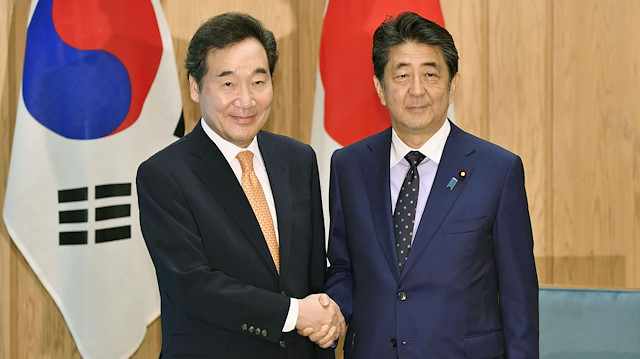
Meeting aims to break ice between 2 neighboring countries engaged in trade war
The Japanese prime minister and his South Korean counterpart held talks in Tokyo on Thursday, media reports said.
The meeting held on the sidelines of Japan’s imperial coronation ceremony aimed to break the ice between two neighboring countries engaged in trade war.
Though Japanese media played down the media saying that the prime ministers -- Lee Nak Yon and Shinzo Abe -- made “little progress”, the South Korean media claimed that two sides “agreed to commence diplomatic efforts in earnest for an early resolution to their frayed ties”.
It is the first time in a year that such a high-level meeting took place between two neighbors which are strategic partners of U.S. in the region. The meeting lasted for 21 minutes.
Lee also handed over a letter from South Korean President Moon Jae In to Abe in which he termed Tokyo as an "important partner" in maintaining peace in Northeast Asia, Kyodo news reported.
Bilateral relations noose dived between two countries last year after a South Korean court asked Japanese firms to compensate for forced labor during Japan's colonial rule over the Korean Peninsula from 1910 through the end of World War II in 1945.
Tokyo denied to obey the ruling saying that colonial era issues were settled by 1965 agreement under which Japan provided South Korea with $500 million for "economic cooperation”.
The two sides downgraded trade relations while Tokyo also restricted export of important elements for South Korea’s tech industry.
Japanese premier is said to have asked his South Korean counterpart that Seoul should "keep its promises" under the 1965 accord to give the neighbors a chance to return to a "healthy relationship".
"The two prime ministers shared the view that South Korea and Japan, as important neighboring countries, can't leave the difficult situation of bilateral relations as it is," South Korea's Vice Foreign Minister Cho Sei-young told reporters in Tokyo, according to Seoul-based Yonhap news agency.
The report added that South Korean premier assured his Japanese counterpart that Seoul will continue to comply with a 1965 bilateral treaty.


